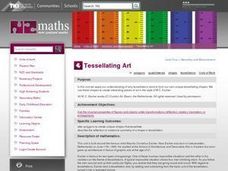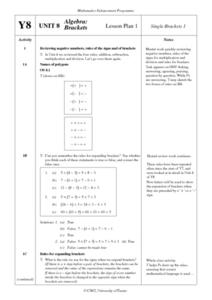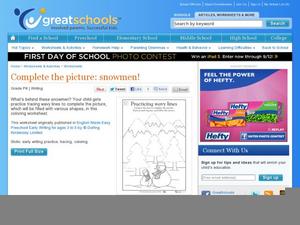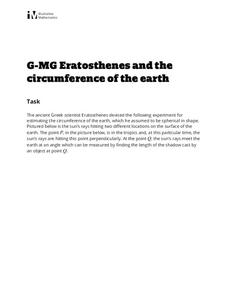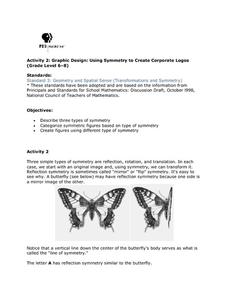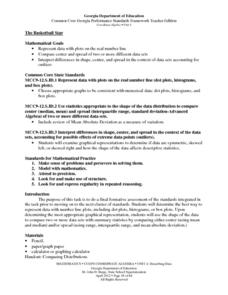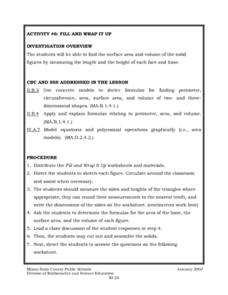Curated OER
Using 2 and 3 Dimensional Geometric Shapes
Pupils explore geometry by participating in a shape identification activity. In this figure dimensions instructional activity, students identify the difference between 2 and 3 dimensional shapes by their vertices and faces. Pupils...
Curated OER
Polygons
Fourth graders identify and describe lines, shapes, and solids using formal geometric language. They use Inspiration to create a graphic organizer and outline of polygons.
Curated OER
Tessellating Art
Fourth graders create artwork showing their own unique tessellating shapes. They apply the symmetries of a regular polygon and describe the reflection or rotational symmetry of a figure or object. They share their art work with the class.
Curated OER
Tetrominoes Cover-Up
Third graders are given square tiles and participate in a demonstration on how to arrange them. Using the tiles, they work with a partner to discover how many two-dimensional tetrominoes they can create. To end the lesson, they must...
Curated OER
Polygons All Around Us!
Students explore the concept of polygon properties. In this polygon properties lesson plan, students draw polygons with different numbers of sides such as pentagons, octagons, hexagons, etc. Students identify different geometric shapes...
Curated OER
Angles in Art Lesson
Students examine the correlation between art and math. Using their computers, students construct and measure angles. Students identify the properties of angles and polygons. They engage in the Angles program on their Palm and use the...
Curated OER
Algebra: Brackets
Students review and practice negative numbers, rules of signs and of brackets that include addition, subtraction, multiplication and division. Included in this lesson is polygons and expanding brackets. Mastery of mathematical language...
Curated OER
Creating Tessellations
In this creating tessellations worksheet, 10th graders solve 2 word problems that include creating various tessellations. First, they explore the various techniques used to form tessellations, including triangles, quadrilaterals,...
Curated OER
Perimeter and Area
In this perimeter and area worksheet, 9th graders solve 17 various types of problems, mostly word problems related to determining the area or perimeter of a geometric shape. They also determine the area and perimeter of shaded portions...
Curated OER
Geometric Shapes and Angles
In this geometry worksheet, 10th graders review polygons and solve for the missing angles of trapezoids and isosceles triangles. There are 10 questions on this worksheet with an answer key.
Curated OER
Math Regents Exam Questions: Surface Area and Volumes
In this surface area and volume worksheet, students solve 4 short answer and multiple choice problems. Students find the volume and surface area of cylinders and prisms.
Curated OER
Complete the Picture: Snowmen!
Finish the winter wonderland with your preschoolers. They trace pine trees and the tops of mountains to complete the snowy drawing. Have them color their paper and display the drawings during a winter unit!
Cord Online
Pyramids and Cones
Young mathematicians find the surface area and volume of a square pyramid and a cone. In what looks like a typical activity out of a textbook, you'll find an activity where learners find an unknown measurement of a pyramid or...
Illustrative Mathematics
Eratosthenes and the Circumference of the Earth
The class gets to practice being a mathematician in ancient Greece, performing geometric application problems in the way of Eratosthenes. After following the steps of the great mathematicians, they then compare the (surprisingly...
PBS
Using Symmetry to Create Corporate Logos
Young mathematicians investigate the use of symmetry in graphic design. After first learning about reflection, translational, and rotational symmetry, children use this new knowledge to identify symmetry in letters of the...
Curated OER
Symmetry Worksheet IV
Challenge your class to identify, label, and draw a wide range of symmetries with this worksheet. In addition, learners name symmetrical shapes and compare them to alphabet letters. This worksheet asks class members to work with lines of...
Curated OER
Transformations
Several practice exercises suitable for any geometry class working on transformation, symmetry, and tessellation -- especially visual representations of image translation, rotation, and reflection, symmetry, tessellations and tangrams --...
Georgia Department of Education
The Basketball Star
Have learners use math to prove they are sports stars! Assess a pupil's ability to create and analyze data using a variety of graphs. The class will be motivated by the association of math and basketball data.
Futures Channel
Folding Circles
Students investigate properties of circles. In this geometry activity, students differentiate between similarity and congruence as they observe polygons. They investigate properties of two and three dimensional shape.
Curated OER
Sorting and Classifying
Fifth graders are engaged in sorting and classifying geometric shapes of various colors and sizes. They discuss the properties of these shapes and illustrate a range of classifications using Venn diagrams.
Illustrative Mathematics
Why Randomize?
Your statisticians draw several samplings from the same data set, some randomized and some not, and consider the distribution of the sample means of the two different types of samplings. The exercise demonstrates that non-random samples...
Curated OER
Understanding Visual Fractions
Each of these sets of squares represents a fraction: Can your scholars match them correctly to the numeric fraction list? This may be a good way to show learners numerators and denominators, as they will see them in the fractions and...
Curated OER
Fill and Wrap It Up
Students find the surface area and volume of the solid figures by measuring the length and the height of each face and base. They use concrete models to derive formulas for finding perimeter, circumference, area, surface area, and volume...
Curated OER
Grab the Candy
In this ordered pairs worksheet, students place candy shaped markers on a grid sheet. They roll the dice to form an ordered pair. They place a marker on that grid square and take the candy piece if there is one located there.


